Christopher Farnsworth's Blog
February 22, 2025
It's Been a Good Couple of Weeks
As of this writing, ROBERT B. PARKER’S BURIED SECRETS is a USA TODAY, Publishers Weekly, and Apple Books bestseller. It has more than a thousand reviews and ratings on Amazon (averaging 4.6 stars out of five) and it’s been featured in stories and reviews from California to New York. It’s been a good couple of weeks.
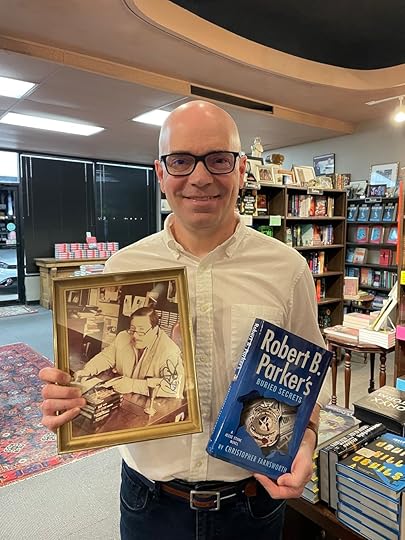
A picture of me with a picture of the man himself, Robert B. Parker, courtesy of Murder by the Book in Houston.
I visited Diesel, A Bookstore in Brentwood, Murder by the Book in Houston, and The Poisoned Pen in Scottsdale, and got to re-acquaint myself with some of my favorite places to buy books and spend time with everyone kind enough to show up. I also visited (virtually) 50 libraries in Massachusetts, RBP’s home state, and talked with Ben H. Winters, who added a little star power and class to the event.
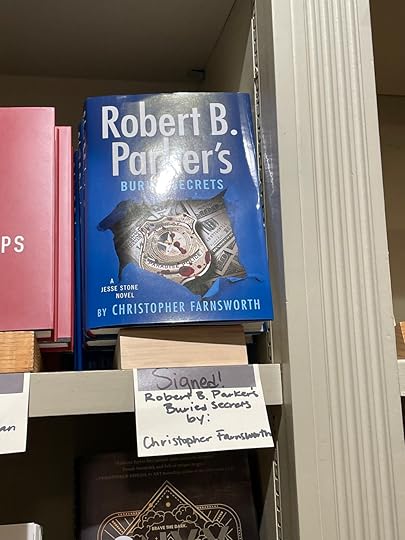
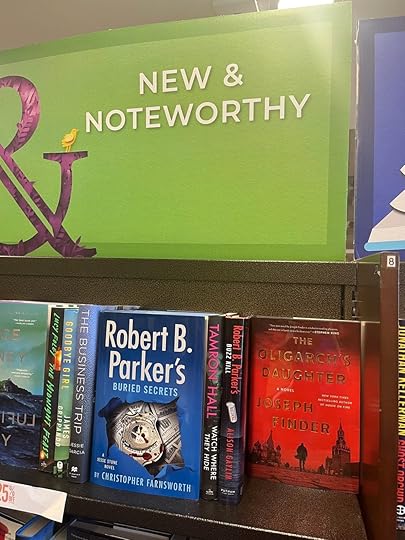
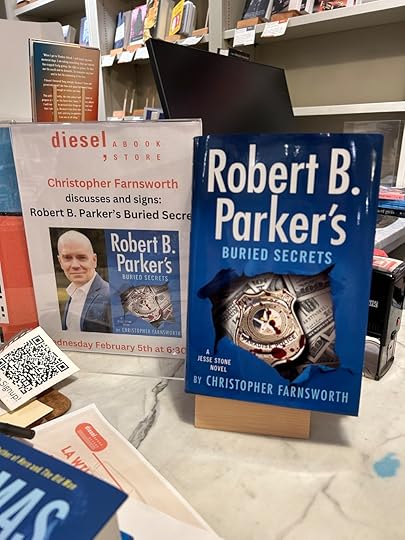
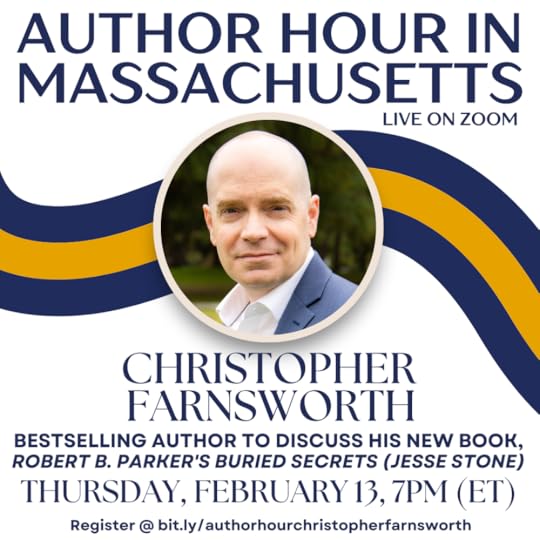
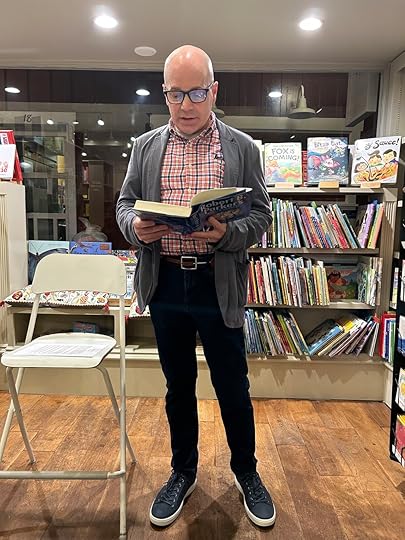
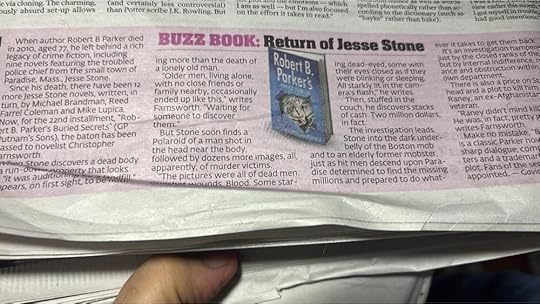
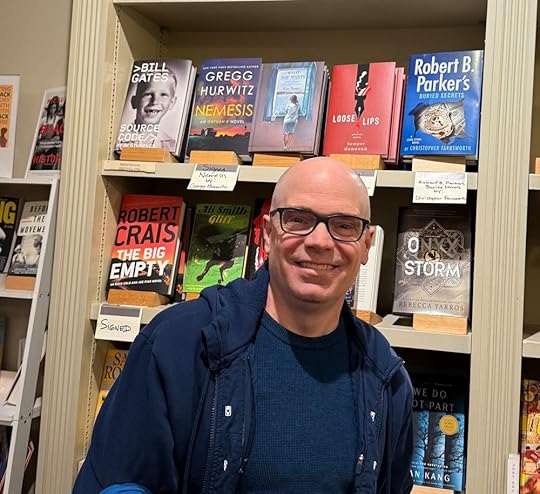
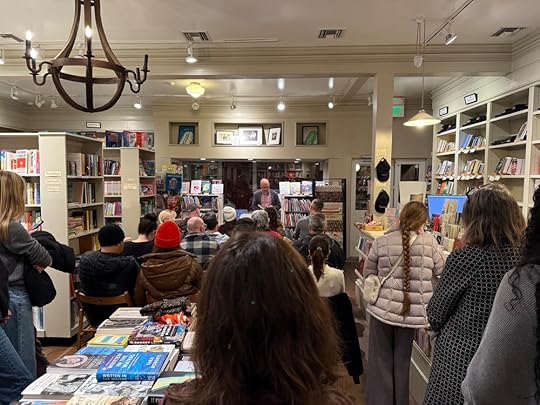
I know this all sounds like bragging, and sure, it is. But mainly, I wanted to say thanks. Thanks to Putnam for footing the bill for all this and to Katie McKee for arranging it with Swiss-watch precision. And thanks as well to Tarini Sipahimalani, whose edits made the book better.
And thanks to everyone who gave me and Jesse a shot again. I know this character is important to so many, and I want to do my best to live up to the legacy. Thank you to everyone who wrote and told me they liked how I’m doing the job so far. Thanks for caring. I am so glad you enjoyed the book. I am aware that the investment of your time and effort and money is a gift. I’m at work on the next book in the series. Hopefully I’ll do even better next time.
Okay. That’s it for the victory lap. Back to typing. Onward. Forward.
And, as always, thanks for reading.
January 23, 2025
On Tour
Hey, if you haven't already heard, I may be coming to a bookstore near you. Here are my tour dates so far for ROBERT B. PARKER'S BURIED SECRETS, the latest in the Jesse Stone series. I’ll be at DIESEL, A BOOKSTORE in Los Angeles on February 5, MURDER BY THE BOOK in Houston on February 6, and THE POISONED PEN in Scottsdale on February 7. I’ll hopefully be adding some more stops on the way, so stay tuned.
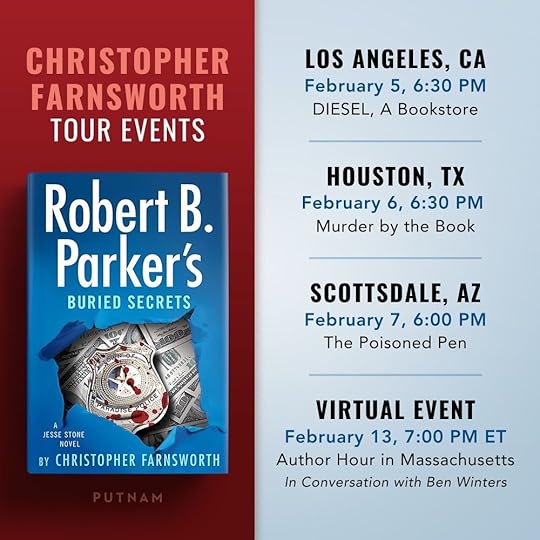
January 14, 2025
Apocalypse Weather
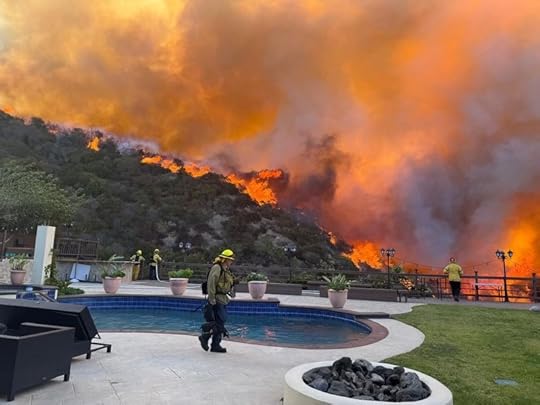
Photo from a friend of a friend on the first day of the Palisades fire.
We’re fine. We’re safe.
That’s what I’ve been telling people for a week now. Family, friends, colleagues, people who like my books and are just concerned. They’ve all seen the news and the Facebook posts and the Instagram videos.
We were never less than five miles from the Palisades fire, which was the closest to us. The evacuation warnings never included our neighborhood, despite a few false alarms. I kept making the same joke: “If the fires cross that much concrete to get to us, then the whole city is in trouble.”
We still packed a go-bag with our vital documents, our wedding album, and a box of baby pictures that I still haven’t gotten around to scanning and uploading to the cloud. The first night, when the Santa Anas reached 100 mph in some places, our house shook harder than it did in the last earthquake. When the wind shifted, flakes of ash fell on our house like snow. I’ve spent most of the week on my phone, shifting between three fire-monitoring apps and then social-media accounts to see which of my friends had been forced to flee.
We were lucky. My family is not among the tens of thousands who lost their homes or had to abandon them with a few minutes warning. The number of people displaced by the fires is larger than the population of the city where I grew up. My kids have at least a dozen classmates apiece whose homes are ashes and memories now.
And this is a tragedy that’s being repeated thousands and thousands of times for people all over LA. It’s easy to forget sometimes that this city has within its borders more people than the population of most U.S. states. There is so much that has been lost.
I admit, I thought it would be more romantic to live inside a Joan Didion essay.
Los Angeles is a city made of stories. We manufacture them here, and we inhabit the ones told by the people who came here before us. LA exists because of the narratives constructed around it by everyone from Harrison Gray Otis to the latest influencers. People still come here looking for the golden life.
That’s why I moved here. But paradise has always been built on the edge of a cliff.
In Stephen Markley’s massive novel The Deluge, there is a sequence where all of Los Angeles, dried out by global warming and drought, burns to the ground in a citywide firestorm. It was science fiction until last week. But then the evacuation warnings reached the flats of Santa Monica, something that has literally never happened before.
In my time in LA, I have seen wildfires, earthquakes, floods, landslides, riots, a pandemic, and an actual hurricane.
Reading that list, there are people who would say that it’s probably time for me to move. That’s not a new idea.
But no place is really safe.
In the past few years, I have made the same calls and emails myself to friends and family in Idaho, Hawaii, Colorado, Oregon, Iowa, and Florida as they’ve faced down their own apocalypses.
Everyplace else is becoming more like California, or maybe it always was.
As much as we’d like to believe that nothing bad will ever happen to any of us, there are no guarantees. I know it is comforting to have the go-bag, the emergency supplies, the home insurance, and all the other Doomsday Prep gear.
You can even try to escape by picking an entirely new place to live, and it won’t work. North Carolina was considered a climate refuge before Hurricane Helene. I thought Seattle was going to be our safety zone, and then I learned about the giant faultline waiting to swallow the entire coast.
As hard as this might be to hear: nobody is really special. Nobody is ever prepared enough, or smart enough, to escape when the worst comes down.
That’s why I am so grateful for all the people who have reached out to us to offer a place to stay, or assistance, or just a kind word. People from all over LA are cramming donation centers with everything they can offer. People from all over the world are donating to charities and foundations and GoFundMes to help people rebuild.
That’s the only way we survive any of the disasters coming at us every day. We help each other. Because despite all our divisions, all we have is each other.
That’s the lesson, every time the world burns. I hope we learn it again.
HOW YOU CAN HELPI know there are a lot of demands for your money, your attention, and your time. But if you’re looking for some places where you can contribute, and you have the means, here’s a list of reputable charities.
WORLD CENTRAL KITCHEN has been feeding firefighters and evacuees since the blazes started.
LOS ANGELES FIRE DEPARTMENT FOUNDATION. This is a way to to show support and appreciation for the men and women who have been working around the clock to fight the fires.
LOS ANGELES FOOD BANK. Losing your house, or being forced away from it, means you’re also cut off from your kitchen and your meals. A lot of people are hungry right now. The food bank is there to help.
THE CALIFORNIA COMMUNITY FOUNDATION. A century-old foundation dedicated to helping Californians. This link is to donate to their wildfire recovery fund.
DIRECT RELIEF INTERNATIONAL. Does what it says. Provides direct relief to people in need in the wake of the fire, especially people in poverty.
211LA. A helpline dedicated to giving individuals the information they need to get assistance and relief.
All of these are rated four stars by Charity Navigator. All of them are places I’ve donated myself. I don’t want to steer you wrong.
I hope you are all safe and well. Thank you again for your kind words and your concern.
And as always, thank you for reading.
June 14, 2022
I Grew up in Idaville
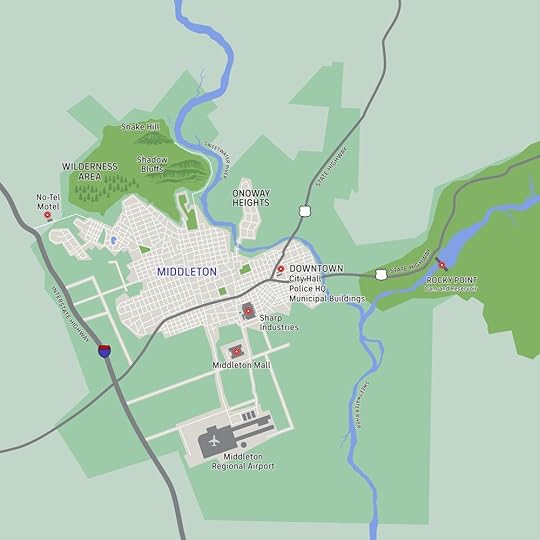
Map of Middleton by Eric Almendral
I grew up in Idaville. I grew up in Riverdale, in Smallville, in Shopton, in a house on Klickitat Street where it meets Rover Avenue. I knew that when I became a teenager, I would drive around in a van and solve mysteries with my friends and my dog. Then, as an adult, I would get a job at Swift Enterprises building spacecraft, or I would open my own detective agency. Or both.
Even as a kid, I knew that wasn’t the way the world really worked. But I wished it did.
I grew up in Boise, Idaho, at a time before the Internet, with four channels on our TV. I walked to school, where my friends and classmates had names that could have been written by Beverly Cleary. I loved reading and books, and when I disappeared into them, I recognized an ideal version of my own world.
So it was not too outrageous to believe that I could be a boy detective or a young inventor. I read books about crime and tried to make robots out of Legos and Micronauts and wished for something cool like a spaceship to appear in the sky. At Collister Elementary, my friends and I traded stories of Bigfoot, or, as we got older, urban legends about the mayor and the richest people in town worshipping Satan at Dry Creek Cemetery. (We dared each other to go out there at Halloween, and while we all said we would, we never did.) We watched monster movie marathons on Channel 12 and passed around Stephen King books like they were contraband.
Even when things got hard, I was lucky in so many ways I only see now.
One way in which I was especially lucky was to have a teacher named Kathy McNally in second grade. She let me write anything I wanted after I proved I couldn’t stick with the topics she put on the chalkboard for our papers. She didn’t see my inability to stick to the lesson as disobedience or disrespect, but creativity. She gave me permission to use my imagination. And I did.
I still am. I wouldn’t be where I am now if not for her.
This week, I’ve released my seventh novel, REUNION, and I tried to put those same feelings of growing up in a magical place into it. There is a boy genius, a girl detective, a young wizard, and a warrior princess. They do their best to keep Middleton, their little part of the world, safe from the monsters, but they are only children. And when they grow up, they have to come back and reckon with everything they thought they left behind. For kids, magic and horror often live side-by-side. The world is big enough to contain unknown monsters, but still small enough to save. Now more than ever, I think we are seeing the truth of that. And that’s the story I tried to tell.
I couldn’t have written this book if I had not grown up where I did, when I did.
REUNION is out in the world now. I hope you enjoy it.
May 23, 2022
REUNION cover reveal
Well, I’ve been practicing shutting up for a while. But I’ve decided it’s time to start talking again. And I’ve finally gotten my new novel to the point where it’s ready for the world, even if the world might not be ready for it.
So here’s the cover for my next book, REUNION.
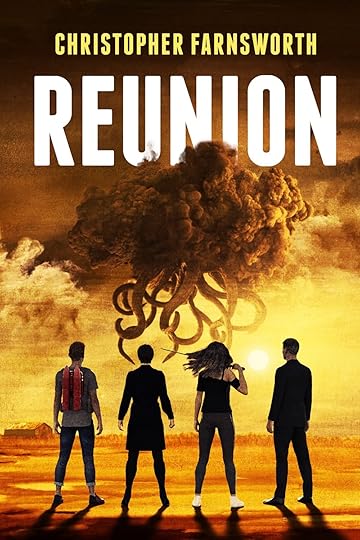 A girl detective. A boy genius. A warrior princess. A young magician. Four young people with extraordinary gifts.For years, they solved mysteries, caught crooks, and slayed monsters. They were secret heroes, keeping an idyllic small town in the middle of America safe from the things that lurked in the dark.Then, the year of their high school graduation, the darkness came for them. During what the media called “New Year’s Evil,” a demonic force rose to turn their hometown into a literal Hell on Earth.They gathered to stop it. They fought. And they won.The rest of the world never discovered the truth behind the disaster. For twenty years, the four tried living like normal people. Now their past is coming back to haunt them.The darkness is gathering once more. They’re summoned back to their hometown to face it, along with everything else they left behind. Whether they want to or not, they’ll have to be heroes again.For fans of Stephen King, Neil Gaiman, and Victoria Schwab, REUNION is about what happens when the good guys grow up.
A girl detective. A boy genius. A warrior princess. A young magician. Four young people with extraordinary gifts.For years, they solved mysteries, caught crooks, and slayed monsters. They were secret heroes, keeping an idyllic small town in the middle of America safe from the things that lurked in the dark.Then, the year of their high school graduation, the darkness came for them. During what the media called “New Year’s Evil,” a demonic force rose to turn their hometown into a literal Hell on Earth.They gathered to stop it. They fought. And they won.The rest of the world never discovered the truth behind the disaster. For twenty years, the four tried living like normal people. Now their past is coming back to haunt them.The darkness is gathering once more. They’re summoned back to their hometown to face it, along with everything else they left behind. Whether they want to or not, they’ll have to be heroes again.For fans of Stephen King, Neil Gaiman, and Victoria Schwab, REUNION is about what happens when the good guys grow up.This is probably my favorite book I’ve written, and it’s certainly the most personal. More to come soon, including publication date and order link.
February 24, 2022
Fight Test
If I were still in the business of being professionally glib, I’d say something today like, “Putin is not only mired in the Cold War, he’s still fighting World War I. He believes an empire is made up of territories and borders, that conquered lands and people are assets, not liabilities, and that he can bomb the world all the way back to the 1950s.”
And it would be utter bullshit, because like 99 percent of the world, I have no real idea what’s happening in Ukraine, and nobody can say what’s going to happen. All I know for certain is that a lot of people are going to die for no good reason, and a lot of people here are going to treat it as entertainment. The closest most of us are going to get to the tragedy is on our screens.
It’s a good day for shutting up. History teaches us a lot of lessons. The problem is, we only learn them after the test is over.
I’ve been quieter in the past couple years, despite the fact that writing is my job, and despite the fact that being wrong about everything does not seem to have stopped other people from shouting their opinions from every platform.
I’m not against this, for what it’s worth. Shout away. It’s the only way we learn what we think, and find out how we’re wrong, which is the only way we get a little closer to being right.
One thing I can say with certainty, after years of writing stories: Conflict sells. We want our narratives to include fights and explosions because they are easy and exciting, and they throw the everyday business of being human into stark contrasts.
But I am trying to be more compassionate about the suffering of people I don’t know, especially when I don’t know what is happening in their lives. Especially when talking about a disease that has currently left a million people in America dead, or the cost it has incurred on the living. Or when I talk about kindergarteners being shelled so someone can make a larger political point.
Today I am thinking about five-year-olds, because I am a parent, and because one of the places that was hit in the hostilities between Ukraine and the Russian-backed separatists was a school called, of all things, “Fairytale Kindergarten.”
Imagine that for a second: a class full of children who are still trying to master tying their shoes being told they have to run and hide because there are people they’ve never met who are trying to kill them. Think of being one of the teachers suddenly burdened with that awful responsibility. Think of any five-year-old you know, happy and laughing or throwing a tantrum or just playing in the corner with their toys — and then, in a moment, that kid’s world now includes the reality of bombs and shrapnel and death.
I am so lucky that I only have to imagine it. I am historically lucky that my children have never had to face it, while so many kids in this world do.
But I cannot imagine anyone, when actually faced with that reality, saying, “Yes, this suffering is good and necessary, and I would gladly litter the ground with these small bodies because I am right.”
That is flat-out insane. And we would rightly consider anyone who walked into that kindergarten with a bomb on a belt or an automatic rifle to be a monster. I have to believe that 99 percent of us would, if placed in that classroom, instantly recognize that nothing is worth killing children. There is no miracle that will come from that sacrifice.
This is how stories can be turned against us, and therefore we have to be careful about what we are sure we know. We only get people in glimpses, even if we get more glimpses than ever before. We see them in 140 characters or screenshots or 10-second video clips. It is so easy to turn them into points to be scored on a board, and excuse their deaths in the name of some larger, grander victory. We do that all the time.
And the people, like Putin, who start these wars are almost never the ones who pay for them. The kindergarteners and their families are the ones who pick up that check.
Our distance from the actual fight is a luxury. We get to turn it into a joke, or a talking point.
But I still feel obliged to say something, because that is how I get through these days. And because I believe we have to name what we love to make sure it survives. It is the same basic thing I have repeated to my kids over and over so I can learn it myself, the simplest possible recitation of fact: We have to use our words to say only what’s true and necessary, even when the temptation is to find all the ways we’re right and they’re evil. Especially when the bombs start dropping.
I still believe most people are doing the best they can, even if the proof of that is sometimes in short supply. I believe in kindness outlasting rage and compassion moving the world into a better direction, like waves slowly eroding the rocks on shore. I believe most of us, if we were in that kindergarten, would embrace those kids and shield them with our own bodies.
I could be wrong. But of all the hills to die on, this seems like the best one to me.
March 4, 2021
The COVID Box
Back at the beginning of the pandemic — which is something I never thought I’d type unless I was working on a zombie novel — I was surrounded by piles of snacks from Costco and searching for something to take my mind off the daily body count. I picked up Nick Harkaway’s massive, challenging novel Gnomon again. It’s a near-future mystery set in a world where everyone is always monitored, and the state exists as a mostly benign busybody, nudging you gently into proper behavior with constant, 24-hour surveillance and AI-calibrated social feedback.
Harkaway throws away concepts that other writers would use for an entire novel. One of those is something called a Reboot Box. In the future he describes, it’s possible to bring people back from otherwise fatal conditions, but not without cost. They often wake up with broken memories, the inevitable result of the mucking about in their skulls and the damage done by induced comas.
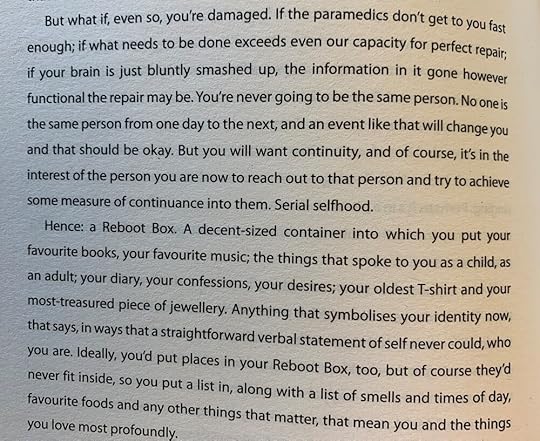
I thought about this a lot, especially as the COVID casualties started to mount. A close family friend of ours was in an induced coma for weeks. When she came out of it, she had to learn how to walk again. And she was one of the lucky ones.
I’ve seen what happens when you lose bits of yourself.
One of my grandfathers died of Alzheimer’s, and before he passed, he would occasionally talk to me and my brother as if we were his sons, bringing up incidents that happened decades before I was born. My stepfather went through dementia before he died as well, and there were times when he would look at me and speak to the kid I was in high school. I could see his difficulty as he tried to bridge the fact of this middle-aged man in front of his eyes with his brain’s certainty that I was still only 16 years old.
I think that’s why he was most comfortable sitting in his chair at the kitchen table every day, reading the same magazine , starting over almost every time he got to the bottom of the page, beginning again at the top as if it were completely fresh to him. It was familiar, and it reminded him of who he was supposed to be: an accomplished businessman, a pilot who soloed when he was 12 and flew jets in Korea, an inventor with multiple patents to his name.
The description of Al, the father in Jonathan Franzen’s The Corrections, seems like a very accurate summary of what he must have felt whenever he got up from that chair, and had to confront the world that would not sit still, that insisted on changing, every time he blinked:
“‘Al? What are you doing?’ He began a sentence: ‘I am — ‘ but when he was taken by surprise, every sentence became an adventure in the woods; as soon as he could no longer see the light of the clearing from which he’d entered, he would realize that the crumbs he’d dropped for bearings had been eaten by birds…”
This past summer, I got to experience a milder form of cognitive decline myself, after a Homer Simpson episode where I cracked my skull. (I was doing pull-ups as part of my quarantine exercise routine, managed to yank the bar from the doorway, fell backward, hit my head on a bottom shelf and tore my scalp open. I got five staples and a mild concussion. On the plus side, I now know my wife can clean up a lot of blood.)
I thought I was fine, and then discovered that I would begin typing a sentence and lose track of what I was saying before I got to the end. I made more typos in a couple of weeks than I had in the whole year before. Reading exhausted me; I couldn’t remember what had happened in the previous chapter, or sometimes on the previous page.
It went away, but I still wonder what I would have done if it didn’t.
There’s a body of research that says much of what we think of as identity — who we think we are — is dependent on context: we become different people when we’re in different situations. We’re not fixed in place, but constantly shifting between different personas as we move through the world.
Likewise, who we are at any given moment depends on what we remember. As much as we’d like to think we have some stable core, we are surprisingly flexible and changeable depending on which version of ourselves we remember at any given moment. As both Daryl Gregory and Ted Chiang have illustrated in their fiction, we are different people at every moment of the day.
The self, like so many of the ways we interact with the world, is a story. And like all stories, it’s changeable. We can rewrite it at any time.
This is why I’m considering a Reboot Box of my own. I am trying to decide what is most important to me, what parts of my life I want to serve as touchstones, what memories I want to keep, and which pieces of me I wouldn’t mind losing.
A year into our quarantines and lockdowns, I know that a lot of other people have been cut loose from everything that used to signify who they are. They no longer have their work family. They no longer have their assigned roles. They may not have a job to go to anymore. They have to inhabit a different life, at home, all the time now. There is less room to be someone else. In some homes, there is no chance to escape.
Or they’re just alone. Which is its own kind of burden, if you don’t want it. Loneliness can actually kill people.
The joke now is that every day in the pandemic is Groundhog Day, and nothing changes. But that’s never true. Everything changes. And I think a Reboot Box — even a mental one — reminds us of that truth.
Lately, at the dinner table, we have taken to looking at the memories some algorithm selects randomly from our twenty-year-archive of digital photos. Our daughters get to see themselves as tiny babies and toddlers again. We get to remember the moments we brought them home from the hospital and what it felt like when the whole world changed because of their presence in it. I get to see myself younger, and wonder at the priorities of that man, and the time he spent as if it were an infinite resource. (My daughters put it another way: “You used to have hair, Dad.”)
I know that I’m lucky in this age of isolation. I’m safe and healthy, and my family is with me in our house with plenty of food and 100 mbps wi-fi. But I need to remember that, or it doesn’t exist. My wife, wiser and better than me, says it all the time: “How lucky we are to be alive right now.”
Of course there are days when I fail. When I’m insufficiently kind, or grateful, for all the gifts and love and luck that I have. When I forget that other people suffer worse with more grace.
Memory, like almost everything else we do, is a choice. Most of the arguments in our culture right now are about which parts we want to include in our stories. With the vaccine — and an end to the pandemic — in sight, I am less worried about being put on a tube and more about what happens next; how we recover from this injury, and how we decide what normal means after more than a half-million deaths.
So I try to remember who I am, and who I want to be. And I hope that tomorrow, I’ll be able to pull those same memories from the box, and be that person again for the first time.
March 18, 2020
Apocalypses, Fast and Slow
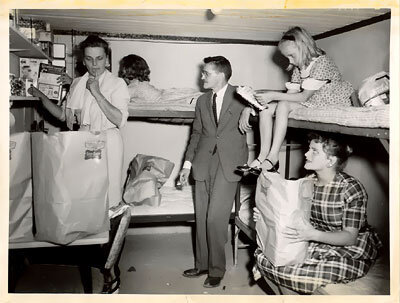
A couple of months ago, my biggest concern about my health was my cholesterol levels. Now I am self-quarantined with my family to escape a deadly virus with no cure and no vaccine. My kids go around the house every day singing, to the tune of “Come On Eileen:”
Covid-19
Don’t know what it means
At this moment
I’m in quarantine…
A hundred years from now, it’s going to replace “Ring Around the Rosie.”
I always wanted to live in a science-fiction novel. I just thought it would be more fun.
***
I’ve spent a lot of time thinking (and reading, and writing) about the End of the World.
I read once that the Black Plague devastated Europe twice. First, when it hit the cities, and spread like wildlife, killing the people who lived clustered closely together. And then, when it spread to the countryside, where people thought they were safe, crops rotted in the fields because there was no one to harvest them. Some of the people who survived the plague starved to death. The first apocalypse was fast. The second one was slow.
So sometimes I wonder what kind of apocalypse we might be facing, and what that means for the survivors.
Zombies — Fast. Massive collapse, almost overnight, in every movie, with the survivors huddling in their homes and deserted malls.
Nuclear war — Fast, then slow. Most of the planet dies in the first exchange. Survivors comb the ruins and battle mutants and disease during the nuclear winter that follows. Plus, you know, Terminators or some other variety of killer robot.
Giant meteor — Slow, then fast. At first, it’s just a small glowing speck in the sky. Then people start to lose their minds as it gets bigger. See Ben H. Winters’ excellent The Last Policeman trilogy for how that plays out.
Alien invasion — Fast, unless they want to eat us. Then slow for the people kept in the human veal pens.
***
In case you were wondering, this is not the Black Plague.
We’ve been here before. This will come as a great shock to those people who cheerfully refuse to vaccinate their kids, but social distancing is what happens when you have a contagious disease and no immunity and no vaccine. My mother went through it in the 1950s, during the last polio epidemic in the United States (she was one of the only kids in town to get a polio vaccine, because my grandmother worked in the local doctor’s office). The entire world went through it in the 1918 Flu Pandemic.
It’s not Doomsday.
But this could be an apocalypse.
Apocalypse is from the Greek word for “revelation,” and sure, it sounds bad. It’s come to mean what was promised in the Book of Revelation: fire and brimstone from the sky, the seas turning to blood, the dead rising, and of course, plagues.
But it also means an unveiling of things not seen. An apocalypse can be the discovery of the truth.
Which, admittedly, can feel like the end of the world.
***
I say this knowing that people are scared, that the last thing many of them need is yet another hot take, yet another goddamn opinion about what it all means, yet another joke about zombie movies. I know there are going to be a lot of people in pain. There are going to be people who lose the loves of their lives, their parents, their grandparents, and their children.
I want to take a moment to confess: I know how lucky I am. My work doesn’t require me leaving the house. We have plenty of money and space and food here. Our biggest problems right now are getting the glitches out of the kids’ online learning classes and figuring out what to stream on Netflix.
I hope that luck holds. I wish no one had to feel any pain. And I am fully aware that words mean little when the shit well and truly hits the fan. When that happens, we hold onto each other and we find comfort where we can.
What we’re facing right now is the kind of dread that comes at three in the morning, when you can’t sleep and you realize that your life is not quite what you expected. I imagine a lot of people, stuck at home with more time on their hands than they’ve had in years, are having that quiet moment.
I think a lot of people are wondering how we got here. And I hope they’re also wondering what we do about it.
Because this is not the last apocalypse we are going to see in my lifetime, or my kids’ lifetime. Much of human history is a long flat line of the drudge work of everyday survival. That’s not where we are now. There will be more diseases jumping the species barrier for which we have no immunity. There will be rising seas, and burning forests and we will have to face all of these problems as they overlap and compound one another.
This will require our best solutions and our best selves. This is where we determine the future. This is a time for us to figure out what really matters to us, and what we really want.
Because if this is the end of the world, then we’re going to have to build a new one.
July 1, 2018
The University of Harlan Ellison
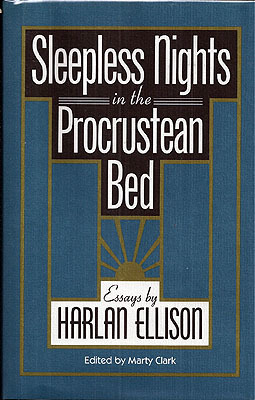
I don't write many fan letters, which is a little odd, because I am a natural fanboy. I suppose it's because I spent so much time being ashamed of my enthusiasms and vaguely embarrassed about all the things I loved so much.
But a couple of years ago, I decided, the hell with that, and I wanted to tell some people how much their work meant to me.
So I wrote Harlan Ellison a letter.
Dear Mr. Ellison,
I was re-reading your collected essays in An Edge In My Voice, and even though you said not to, I wanted to drop you a line.
I was in college in Idaho when I first read The Glass Teat and The Other Glass Teat. This was pre-Internet, just barely. (I was born one day and 37 years after you.) I stumbled along then, trying to figure out how to be a writer.
And your work gave me direction. Before I got my first job at a weekly paper, I read Sleepless Nights in the Procrustean Bed during breaks at my desk as a substitute teacher. I found out that someone could be a writer and proud of it, and actually make a decent buck at it, and still say what he wanted to say. It was something of a revelation to me then. And it’s still an inspiration to me now.
I’m a published author now. My fifth book will be out from William Morrow early next year. I’ve also written screenplays and newspaper articles and I’m currently struggling through a pilot script, despite all your warnings about getting involved in TV. It’s nothing compared to your output. I’m still in awe of that.
But I would not be here now without what I learned by reading you. I didn’t have an MFA program. I had the University of Harlan Ellison. I am not sure how how well I’ve applied my lessons, but I keep coming back for reminders.
So thank you for teaching me by example. You made a big difference in my life, and I owe you for it. Thank you.
Sincerely,
Christopher Farnsworth
I never heard back from him. I never really expected to. He was always more busy writing books and screenplays and comics and short stories, and he'd recently suffered a stroke, which is probably why I felt some urgency about sending him the letter.
He lasted two more years, and wrote more books, and continued to inspire and enrage. I was not, unlike some of my friends, lucky enough to meet him in person. My friend Steve, who interviewed him several times, told me that he still expects to pick up the phone and hear Ellison yelling at him about the quotes he used.
But he meant a lot to me. And I owe him, even though we were never in the same room.
I picked up that copy of An Edge In My Voice again very early this morning when I could not sleep. I found this line, which I had marked:
"We live in a time in which cowardice is garbed in moral outrage.”
Despite his flaws, you can never say that Ellison was silent in the face of injustice. He used his talent to expose the lies he saw and reminded people what real outrage sounds like.
He reminds me that I need to be more courageous. To say what I mean. To write more, and write bravely, and fill the page. Just like he did.
We've all got stories to tell, and only so many days to write them.
May 11, 2018
RIP, Daniel Cohen and Brad Steiger
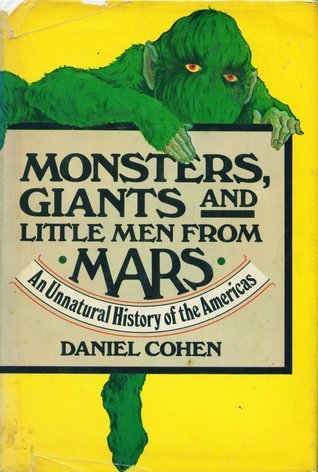
I was saddened to learn today of the deaths of two writers who meant a lot to me when I was growing up. I've written before how I was a strange kid who'd hang out in certain sections of the library, reading all the weird books about weird things, like Bigfoot, Nessie, and UFOs.
Not all of those books were the same, though. Even as a kid, I appreciated the ones that were well-written, that knew how to tell a story, and that actually provided some proof of the unbelievable and impossible things they described.
I learned to look for the names of the authors on those books, and I would pick up whatever they would write.
That's how I first found Daniel Cohen and Brad Steiger.
I was a bigger Cohen fan when I was young. I checked out his Encyclopedia of Monsters so often that it was just my name on the card, over and over again. When he wrote about Mothman and Mokele-Mbembe, it made the world seem bigger. I read everything he had in our public library, but I especially loved The Great Airship Mystery and Monsters, Giants and Little Men from Mars. Honestly, what kid would not want a book with titles like those?
I also read Steiger, but I liked him much more as an adult for one main reason: his books were scary. While Cohen had more of a sense of humor, Steiger could create authentic-sounding horror stories. When I read him, I usually had the lights on. His stories of shadowy evils, especially Out of the Dark and Shadow World, informed and added to the villains and dark forces in my books about Nathaniel Cade.
Reading those books led, eventually, to me writing books myself. I even got to correspond with Steiger a bit after I wrote The President's Vampire when I quoted him in my text. He was very kind and courteous and gracious.
But now both men are gone. I learned from Loren Coleman — another one of my great favorites as a kid — that they both passed away on the same day, May 6, both at the age of 82.
You can read Cohen's obituary here, and Steiger's obituary here.
Unfortunately, there have been several writers about the paranormal who have died within a few weeks of each other. Even though I'm more of a skeptic now than I ever was, I hope that there are other people who keep diving into the deep weirdness out there. I will never forget how these writers opened doors for me, and widened the boundaries of what I considered possible.
In the end, that's one of the best things that writing can do.
I'm grateful, and I am sorry to see them go.



